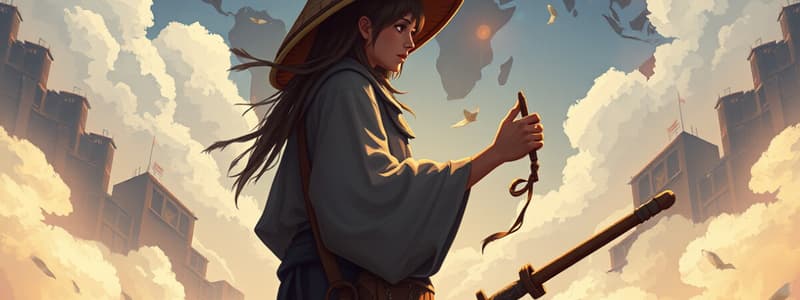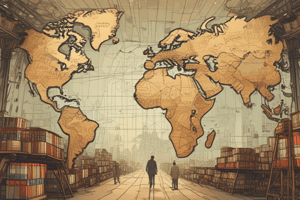Podcast
Questions and Answers
What is the balance of trade?
What is the balance of trade?
- The total amount of goods a country exports.
- The difference between a country's imports and exports. (correct)
- The amount of goods traded between two countries.
- The total amount of goods a country imports.
What is a trade surplus?
What is a trade surplus?
When a country exports more than it imports.
What is a trade deficit?
What is a trade deficit?
When a country imports more than it exports.
What does indemnity refer to?
What does indemnity refer to?
What is extraterritoriality?
What is extraterritoriality?
What sparked the Opium War?
What sparked the Opium War?
What was the Taiping Rebellion?
What was the Taiping Rebellion?
What was the outcome of the Sino-Japanese War?
What was the outcome of the Sino-Japanese War?
What was the Open Door Policy?
What was the Open Door Policy?
Who was Guang Xu?
Who was Guang Xu?
What was the Boxer Uprising?
What was the Boxer Uprising?
Who was Sun Yixian?
Who was Sun Yixian?
How did Western powers gain power in Qing China?
How did Western powers gain power in Qing China?
How did Western powers achieve greater trading rights in China?
How did Western powers achieve greater trading rights in China?
What internal problems threatened the Qing dynasty?
What internal problems threatened the Qing dynasty?
What were the goals of Chinese reformers?
What were the goals of Chinese reformers?
How was the Qing dynasty replaced by a republic?
How was the Qing dynasty replaced by a republic?
Flashcards are hidden until you start studying
Study Notes
Economic Terms in Trade
- Balance of Trade: Refers to the difference between a country's imports and exports. China's regulations allowed for a favorable balance of trade with other nations.
- Trade Surplus: Occurs when a country exports more than it imports. China maintained a trade surplus.
- Trade Deficit: When imports exceed exports. Western nations faced a trade deficit with China, purchasing more from it than they sold.
Historical Events and Concepts
- Indemnity: Compensation for losses due to war; notably, Britain received indemnity and control of Hong Kong following conflicts.
- Extraterritoriality: The right of foreign nationals to be governed by their home country's laws while in another country. British citizens in China enjoyed this privilege.
- Opium War: A conflict that arose when China banned opium, leading to British military action against Chinese ports. The war highlighted China's outdated military equipment.
- Taiping Rebellion (1850-1864): A major revolt against the Manchu Dynasty fueled by social unrest and dissatisfaction with foreign influence. Resulted in 14 years of civil war and an estimated 20-30 million deaths.
International Conflicts and Policies
- Sino-Japanese War: Resulted in Japan's control over Taiwan, marking a significant power shift in the region.
- Open Door Policy: A proposal by the United States aiming to guarantee equal trading rights for all nations in China, promoting international trade.
Key Figures and Reforms
- Guang Xu: The young emperor who initiated the Hundred Days of Reform, targeting modernization of industries, education, and military. His reforms met opposition from conservatives, resulting in his imprisonment.
- Sun Yixian: Leader of the Revolutionary Alliance advocating for China's modernization based on the "Three Principles of the People": nationalism, democracy, and livelihood.
Resistance Movements
- Boxer Uprising: A secret society known as The Righteous Harmonious Fists aimed to expel foreign influences in China. This led to attacks on foreigners and a multinational military response.
Western Power Dynamics
- Western Diplomacy and War in Qing China: Utilized formed multinational forces and conflicts to exert influence over Qing China.
- Unfair Treaties and Trading Rights: Western powers gained trading rights through unequal treaties like the Treaty of Nanjing, which mandated the opening of five ports in China.
Internal Challenges and Governance
- Qing Dynasty's Internal Problems: Faced challenges from neglected irrigation systems leading to flooding and a rapid population increase.
- Goals of Reformers: Aimed to modernize civil service exams, streamline government processes, and promote new industries to address issues.
- Fall of the Qing Dynasty: The dynasty was replaced by a republic due to internal strife, political disagreements, and a weak government structure, leading to revolutionary movements without effective reform.
Studying That Suits You
Use AI to generate personalized quizzes and flashcards to suit your learning preferences.




